Do Baby Canines (Eruption) Change? What Parents Need to Know About Baby Canine Teeth Eruption in Children will be shared by BeDental in the following article, let’s find out!
In the article below, BeDental will help you understand all the information about baby canine tooth eruption in children. Additionally, we will answer the question of whether baby canines change and what to consider when a child’s canines erupt.
Understanding the structure of your child’s teeth to determine the position of the canines
Before addressing the question of whether baby canines change, you need to have a clear understanding of your child’s tooth structure. Different from adult teeth, the position of baby canines in young children is quite unique. Being able to determine which tooth is the baby canine will make the baby canines eruption process smoother
Let’s learn about baby teeth and permanent teeth in young children:
About baby teeth – Do baby canines eruption change?
Do baby canines eruption change? Baby teeth are the teeth that erupt when a child is 5-6 months old. By around 3 years old, a child’s baby teeth are usually complete with about 20 teeth in the dental arch. All baby teeth will include: 4 incisors, 4 lateral incisors, 4 canines, and 8 molars evenly distributed in both the upper and lower arches.
When a child has completed these teeth in the dental arch, they will be able to chew better. Additionally, nutrient absorption into the body will also be easier. Importantly, the completion of these teeth helps the child pronounce clearly and avoid speech issues.
During the baby canines eruption phase, a child’s jawbone will also develop. Based on the stimulation force of chewing, the jawbone will develop more stably, helping to balance the facial structure.
That’s why you need to take care of your child’s baby teeth until they are replaced. Around 6 years old, baby teeth begin to shed and are replaced by permanent teeth.
About permanent teeth
When entering the phase of baby teeth shedding, a child’s dental arch will have a total of 32 teeth. This includes 4 central incisors, 4 lateral incisors, 4 canines, 16 molars, and 4 third molars (wisdom teeth). Typically, by the age of 12, a child will have erupted 28 permanent teeth. The remaining 4 wisdom teeth will erupt later, between the ages of 17-25.
Permanent teeth are the final set of teeth in humans and cannot be replaced. Therefore, you need to take care of your child’s permanent teeth carefully to ensure optimal chewing function and aesthetics.
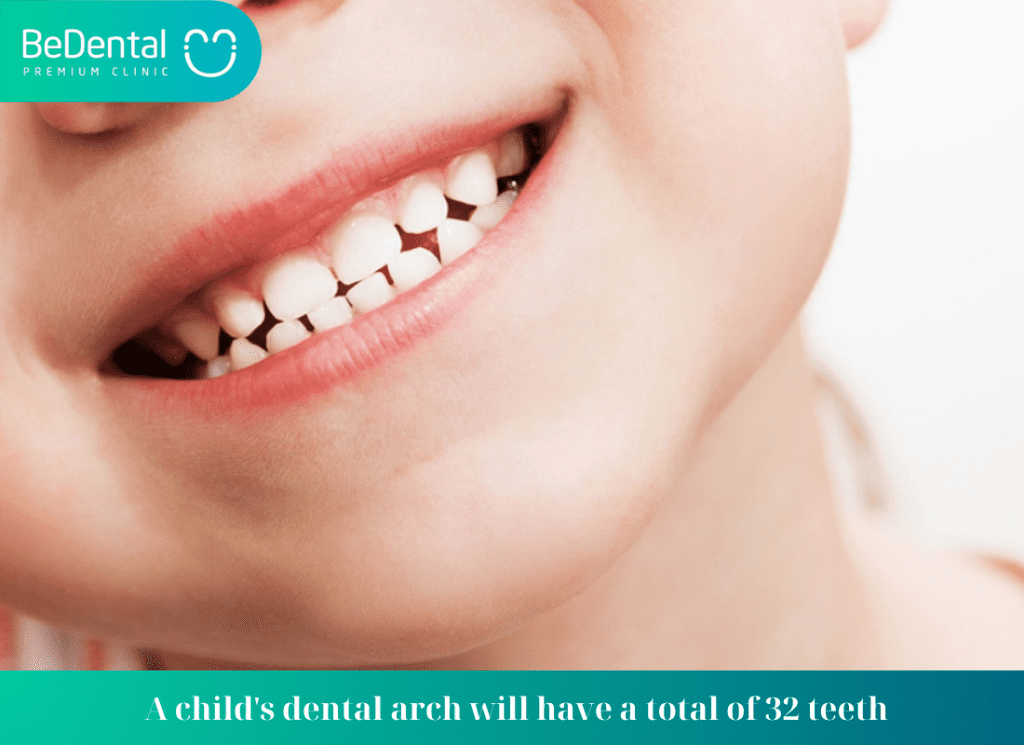
When do children grow canine teeth?
When do children grow canine teeth? Actually, baby canine teeth are the teeth numbered 6 and 7 in the dental arch. These are the teeth that play a role in grinding food before it is swallowed and help children become accustomed to solid foods.
Children’s canine teeth usually erupt when they are 6-7 years old. At this time, the canines will emerge and break through the gums. Bacteria can invade the cracked area, leading to infection and causing fever or swelling. Additionally, the size of the canines is larger than other teeth, so children often experience more pain and fever during baby canines eruption.
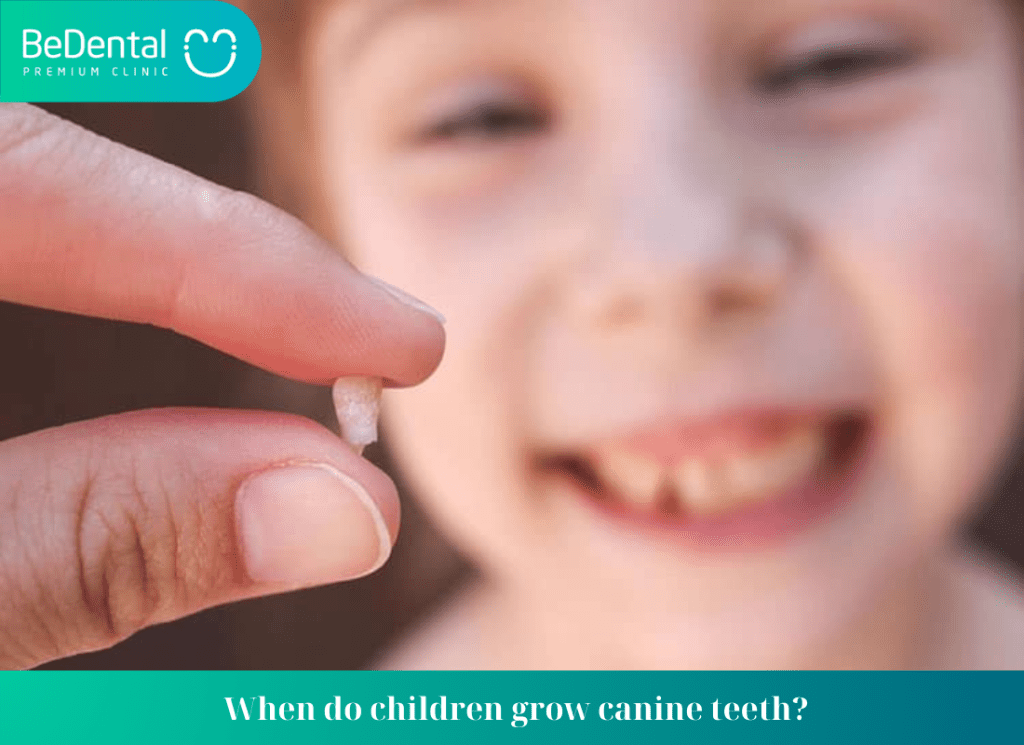
Signs of baby canine teeth eruption in children that you should know
When children grow canine teeth, the signs are usually more noticeable compared to other teeth. Specifically, the signs of baby canines eruption in children include
- Gum pain and swelling: As the teeth break through the gums, it can cause discomfort and pain. Chewing and swallowing food may become more difficult. Therefore, along with gum pain and swelling, children may also experience a decreased appetite.
- Drooling: Excessive drooling during baby canines eruption can be a result of increased saliva production. Additionally, if the child has a fever due to teething, drooling and a runny nose may also occur.
- Restlessness and crying:The pain from baby canines eruption is often more intense compared to other teeth, so children may become restless and cry persistently. This may also be accompanied by difficulty sleeping and waking up at night.
See more: What is Dental material ? Where to buy
How many days will children have a fever during baby canines eruption?
The duration of a fever during baby canines eruption is a concern for many parents. If the fever is not reduced early, it can lead to nutrient depletion and affect overall health.
As mentioned above, it is important to understand that teething itself does not cause a fever. The cause of the fever is the cracked gums that occur when the teeth erupt. This creates an environment for bacteria to invade and cause inflammation, leading to a fever. When the fever subsides, it indicates that the inflammation is under control.
Compared to other teeth, baby canines eruption often causes a longer-lasting fever due to their larger size. Most children have a fever for 2-3 days during the eruption of their canine teeth. However, the duration of the fever may vary depending on each child’s individual factors.
Note: If a child has a fever for more than 5 days during baby canines eruption, it is advisable to take the child to reputable hospitals for examination and timely treatment to avoid potential complications.
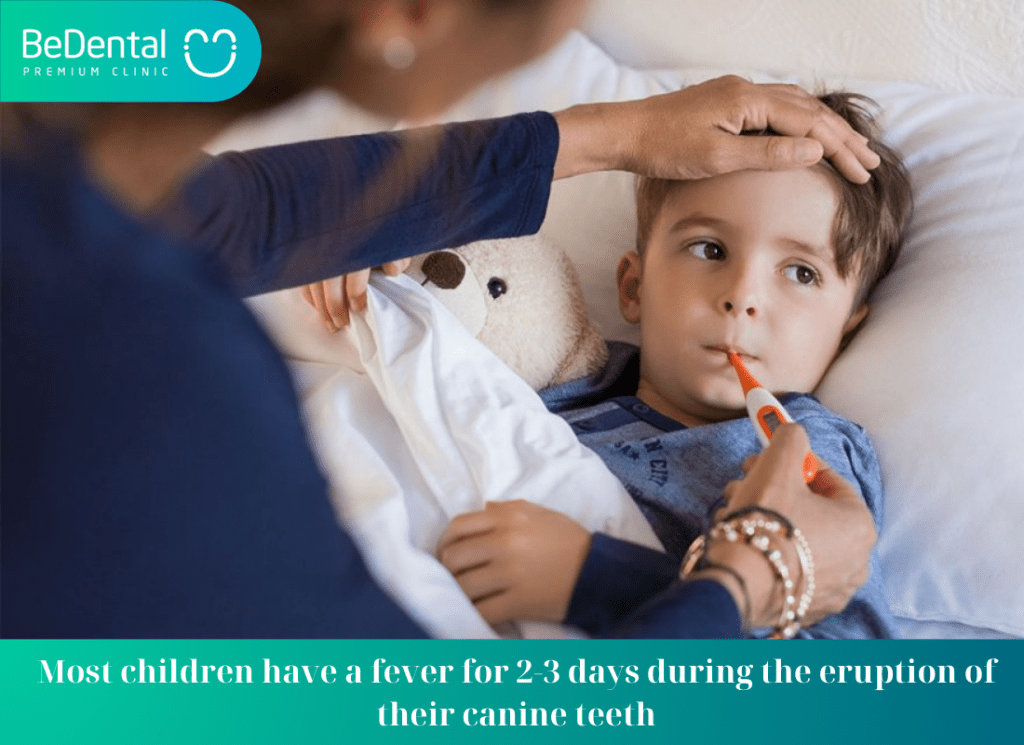
How to relieve pain when children grow canine teeth?
How to relieve pain when children grow canine teeth ? When teething with canine teeth, children will feel extremely uncomfortable but cannot express it in words. At this time, children will often cry and disturb, so you should be gentle and take good care of them.
So how do you reduce pain and reduce fever for children when teething with canine teeth? Here are some ways you can refer to and apply:
- Gently massage the gums: Use a sterile mouth swab to remove bacteria from the gums. This not only reduces bacteria but also helps relieve pain. Experts recommend using specialized mouth swabs containing natural antibiotics to help fight inflammation and safely reduce fever when children grow canine teeth, particularly during baby canines eruption
- Provide cool water for the child: Cool water helps reduce gum swelling and quickly soothes pain, making the child feel much more comfortable.
- Dry the drool for the child: Excessive drooling can cause irritation and inflammation. Therefore, you should dry the drool for the child.
- Choose appropriate food: During this time, you should supplement soft and liquid foods such as porridge, smoothies, milk, etc. to help the child relieve pain when chewing and swallowing. Soft food also helps minimize gum damage.
- Reduce fever properly: When children grow canine teeth, pain and fever are inevitable. If the fever is below 38.5 degrees Celsius, you can use a specialized cool towel or use traditional methods to gradually reduce the fever. However, if the child has a high fever, you should take them to a specialized pediatric clinic immediately, especially if you suspect complications from the baby canines eruption.
Do baby canine teeth change?
After learning which teeth are the baby canine teeth, many parents are concerned about whether baby canine teeth will change. In practice, there have been cases where parents believed that baby canine teeth would change, so they intervened and extracted the baby canine teeth, leading to the risk of tooth loss,often due to misunderstandings about baby canines eruption
So do baby canine teeth really change? To answer the question of whether baby canine teeth change, BeDental has consulted the opinions of many dental experts and learned that:
Baby canine teeth do not change. Canine teeth are the teeth in positions 6 and 7 in the dental arch. They are permanent teeth and only erupt once in a lifetime. Therefore, the answer to the question of whether baby canine teeth change is NO. In addition, according to folklore, “canine” is a term that means not allowed to be pulled out or touched.
Therefore, after knowing that baby canine teeth do not change, you need to know how to care for and maintain proper oral hygiene for your child. This will help ensure good oral health and avoid the risk of permanent tooth loss due to a lack of understanding about whether baby teeth change, or the process of baby canines eruption.
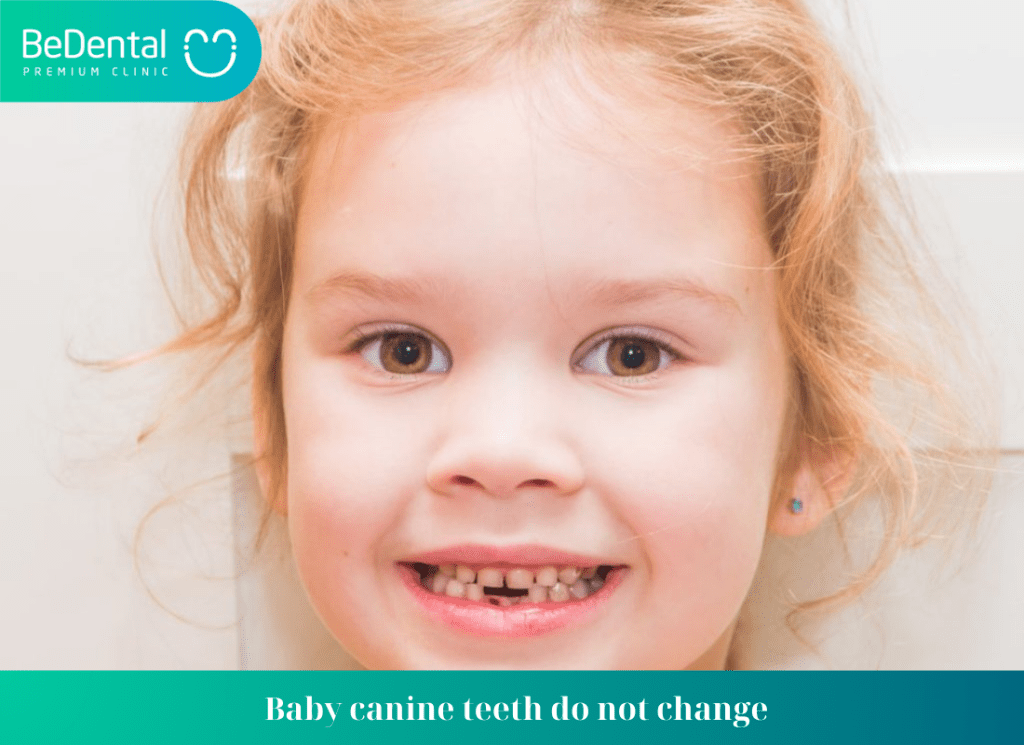
Does removing baby canine teeth have any effects?
After knowing whether baby canine teeth can change or not, many parents have tried to take care of their child’s oral health, but due to various factors, the dentist had to recommend removing the baby canine teeth often due to complications of baby canines eruption. So does removing baby canine teeth have any effects?
Losing canine teeth not only reduces the chewing function of the entire jaw but can also seriously affect the child’s oral health. Canine teeth are responsible for chewing and grinding food before it enters the stomach. When canine teeth are lost, this activity will be affected to some extent, making the process of eating and drinking much more difficult.
In addition, the upper and lower teeth work in symmetrical movements to grind food. When baby canine teeth are lost, the child tends to chew unevenly, which can affect the facial muscles and cause imbalance such as deviated nose, asymmetric face, etc., seriously affecting aesthetics.
See more: Are porcelain veneers necessary?
Furthermore, the jaw teeth tend to wear out faster than other teeth due to the continuous chewing and grinding of food. That is also the reason why when canine teeth are lost, the surrounding teeth gradually weaken, making it easier for plaque to accumulate and causing diseases such as cavities or pulpitis.
When should a child have their canine teeth removed?
When should a child have their canine teeth removed? Although the answer to the question of whether baby canine teeth can change is no, there are still some reasons why the dentist may recommend removing the baby canine teeth. Specifically, a child should have their canine teeth removed when:
- The canine teeth are severely decayed or have irreversible pulpitis that cannot be treated with other methods.
- The canine teeth are severely traumatized and cannot be restored with advanced methods such as veneers or dental bonding.
- The canine teeth have dental diseases such as severe cavities or severe gum inflammation, posing a risk of permanent tooth loss.
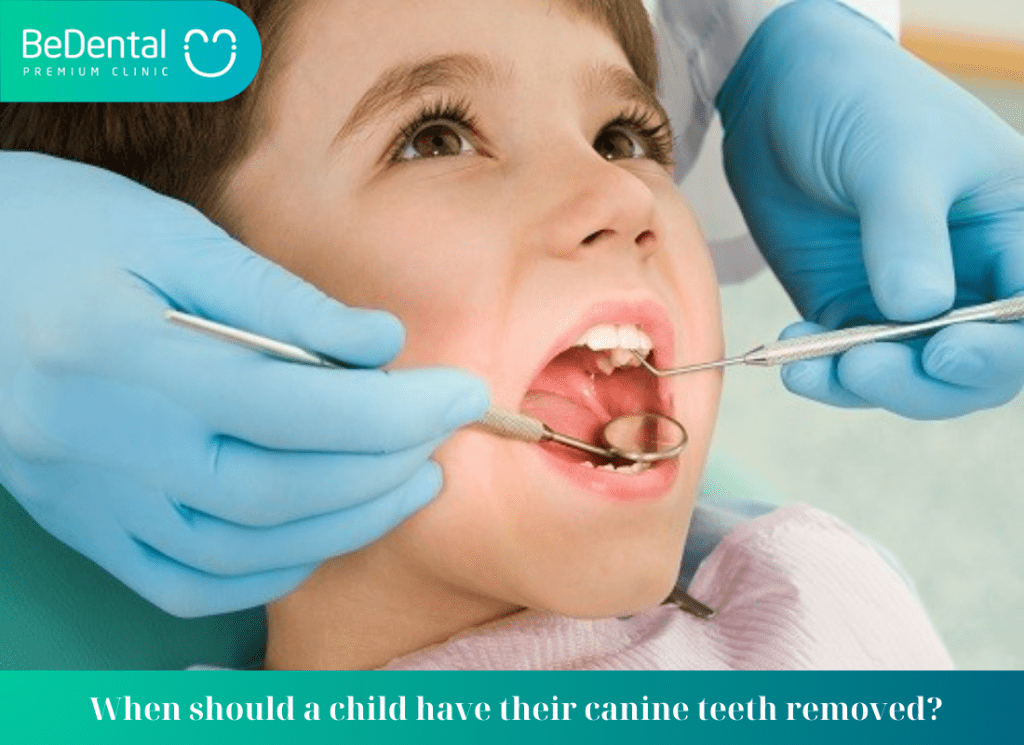
Can baby canine teeth be replaced?
Because it is clear that baby teeth cannot be replaced, many parents have sought methods of implanting false teeth to restore both aesthetic and chewing function for cases where a child has to have their canine teeth removed.
However, in children under 16 years old, the jawbone structure is still not fully developed and complete. Therefore, implanting false canine teeth at this time is not advisable as it can negatively affect the child’s jawbone.
At this time, the child needs to wait until the jawbone is strong enough before proceeding with dental implantation. Typically, children aged 18 and older will be able to ensure the safety of the dental implant process to replace the lost canine teeth.
What should be done if a child’s canine teeth are severely decayed?
The issue of a child’s canine teeth growing but still being severely decayed is quite common. To address this situation, you can follow these steps:
- Take the child to a dentist to examine and determine the depth of tooth decay. The dentist will provide advice and appropriate treatment methods.
- Ensure proper oral hygiene for the child. You can help the child brush their teeth properly and regularly according to the recommended schedule from the dentist. Additionally, you should instruct the child on how to use dental floss to clean between the teeth.
- Limit fast food and alcohol-containing foods, especially before bedtime.
- If the dentist advises you to use fluoride to care for the child’s teeth, you should follow the instructions correctly.
- If the child is too young and does not know how to clean their mouth, you should use toothbrush and mouthwash for the child to help clean their mouth.
- If the child’s tooth decay worsens, the dentist may use measures such as scraping, whitening, or root canal treatment to improve the condition.
Remember that proper oral care is essential to protect and keep the teeth healthy. If you need more information or advice, seek help from a dentist.
Scientific guidelines for caring for baby canines teeth
After understanding the process of baby canines eruption and the fact that these teeth cannot be replaced, it’s crucial to prioritize oral care. Young children often don’t grasp the importance of oral hygiene, so parents play a vital role in guiding them. This includes preventing oral diseases and protecting those precious baby canines during and after eruption.
Here are some scientifically proven ways to care for your child’s teeth, with a focus on supporting healthy baby canines eruption:
Oral hygiene practices
- You should instruct your child to brush their teeth 2-3 times a day, with each brushing session lasting at least 2 minutes.
- Use a soft, small-bristled toothbrush and brush the teeth gently.
- Guide the child to use dental floss to clean between the teeth and at the gumline.
- Guide the child to use saline solution or mouthwash to thoroughly clean the teeth.
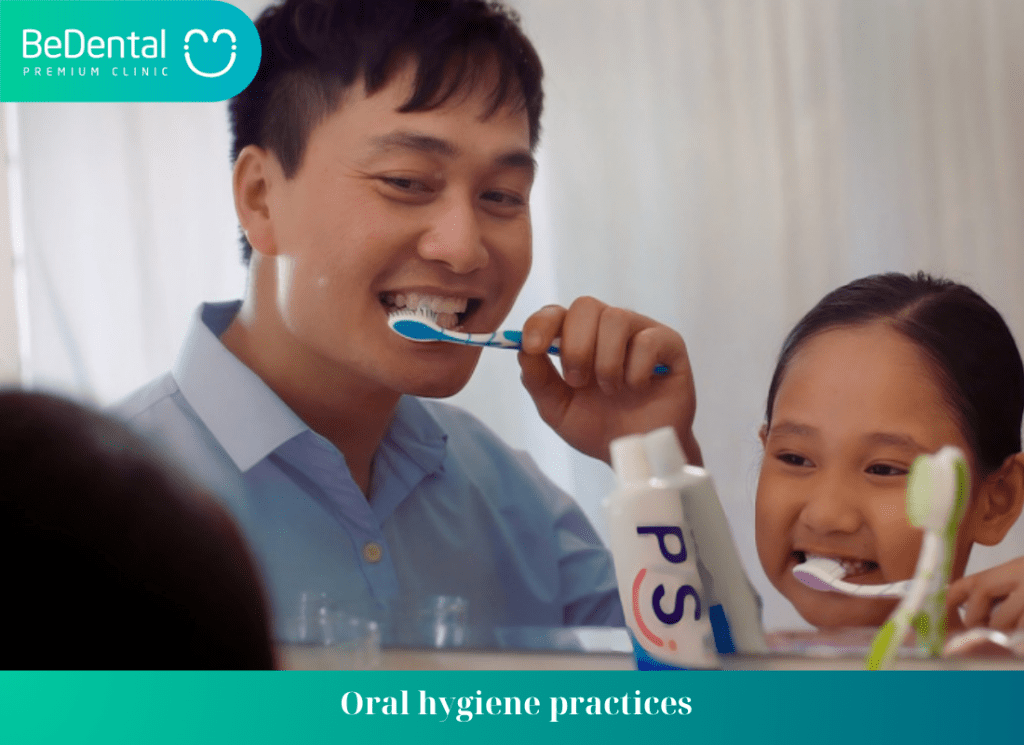
Daily diet
- You need to control the intake of sweet or overly sugary foods, starches such as cakes, candies, soft drinks, ice cream, dried fruits, etc.
- Ensure that the child drinks plenty of water every day.
- Include foods rich in vitamins and minerals that are good for oral health, including fresh vegetables, fruits, fish, eggs, milk, whole grains, etc.
Regularly visit the dentist for check-ups.
To ensure healthy baby canines eruption and protect the entire oral cavity from dental diseases, regular dental check-ups are crucial. Taking your child for check-ups 2-3 times a year can help monitor their baby canines eruption and address any potential issues early on.
This article has provided valuable insights into baby canines eruption and answered the question of whether these teeth can be replaced. Since baby teeth, including canines, cannot grow back, it is essential to establish a good oral care routine to protect them. Contact BeDental for personalized advice on caring for your child’s teeth during and after baby canines eruption, and we will provide free support 24/7.
For further reference:
Tư vấn chuyên môn bài viết:
BÁC SĨ DƯƠNG THỊ THÙY NGA
BEDENTAL - TOP STANDARD DENTISTRY SYSTEM
In HANOI
Address 1: 7B Thi Sach St, Ngo Thi Nham, Hai Ba Trung Dist, Ha Noi. - 0934.61.9090
Address 2: No 129 Hoang Ngan, Yen Hoa, Cau Giay Dist, Ha Noi. - 0934.61.9090
In HO CHI MINH
Address 1: 53 -55 -57 Pho Duc Chinh St, Nguyen Thai Binh, Dist. 1, Ho Chi Minh. - 0766.00.8080
Working: 9am - 8pm everyday
Website: https://bedental.vn/en/






Pingback: HOW LONG DOES TEETH WHITENING TAKE? HOW LONG DOES TEETH WHITENING LAST? – Be Dental
Pingback: Introduction to 5 familiar dental filling tools – Be Dental
Pingback: Is mouth rinsing with betel leaves really effective? – Be Dental
Pingback: Is Tb mouthwash good and what should be noted? – Be Dental
Pingback: Common Types of Premium Dentures – Cost of Premium Dentures – Be Dental
Pingback: How to treat a 5-year-old with a cavity in their upper jaw effectively – Be Dental
Pingback: What are the consequences for baby teeth if children have tooth decay in tooth number 6? – Be Dental
Pingback: Can pregnant women get dental fillings? A dental guide for pregnant and breastfeeding mothers. – Be Dental
Pingback: Which types of porcelain veneers are used? – Be Dental
Pingback: How does the process of making removable dentures take place – Be Dental
Pingback: Are Efferdent and Polident Denture Soaks Good? 3+ way to Properly Store and Clean Removable Dentures? – Be Dental
Pingback: Wisdom Tooth Extraction Causes Instability and Pain in Tooth No. 7 – Be Dental
Pingback: What should be done if a molar tooth has decay? Should it be extracted or not? – Be Dental
Pingback: What is white tongue disease? Causes and some treatment methods. – Be Dental
Pingback: Chest pain – Things you should know – Be Dental
Pingback: How much does dental bonding for gaps and chips cost? 3 cases where dental filling can be performed. – Be Dental
Pingback: How much does a root canal filling cost? Does tooth filling hurt? – Be Dental